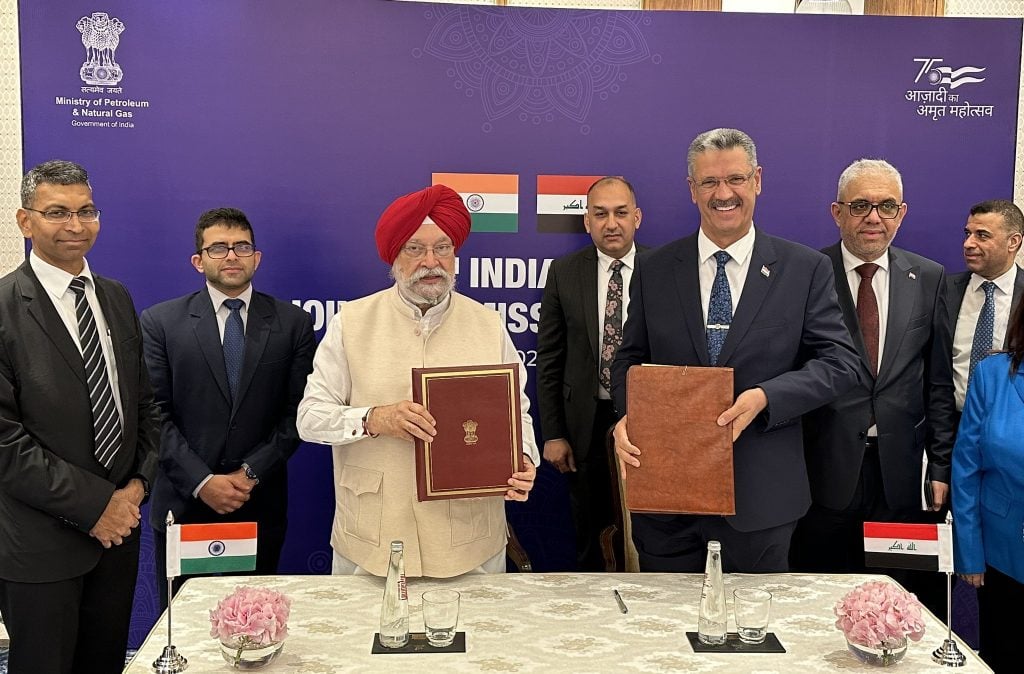Indian Oil Minister Hardeep Singh Puri confirmed that his country is seeking to increase its imports from Iraq, in order to raise the total Indian oil supplies, which currently amount to about one billion barrels. New Delhi places the highest priority on a multidimensional and comprehensive partnership with Baghdad.
Puri headed his country’s delegation to the 18th meeting of the Joint Indian-Iraqi Committee for Economic and Technical Cooperation, with an Iraqi delegation headed by Deputy Prime Minister and Iraqi Oil Minister Hayan Abdul Ghani.
The Indian Oil Minister stressed that his country is Iraq’s second largest trading partner, with annual trade amounting to $37 billion, according to his statements, which were seen by the specialized energy platform, quoting his official Twitter account.
“Today, India is the world’s third-largest energy consumer, the third-largest oil consumer, the third-largest consumer of liquefied petroleum gas, the fourth-largest importer of LNG, the fourth-largest refiner, and the fourth-largest car market in the world,” Puri said.
“India will continue to be one of the largest centers of demand for energy resources,” he added.
Memorandum of understanding for cooperation between Iraq and India
For his part, Iraqi Oil Minister Hayan Abdul Ghani stressed the importance of developing and expanding the horizons of bilateral cooperation with India in all fields, including the economic, trade, financial, technical, health, agricultural, cultural and other fields.
This came during the signing of a memorandum of understanding for bilateral cooperation between Iraq and India in all fields, with his Indian counterpart, Indian Oil Minister Hardeep Singh Puri, in the Indian capital, New Delhi.
Hayan Abdul-Ghani said that his country “considers India as an important trading partner and one of the most important importers of Iraqi oil, with whom we have historical relations, friendship and distinguished cooperation, and India today represents an economic and industrial power that is witnessing rapid growth,” according to what was stated in a press statement issued by the Iraqi Ministry of Oil. Power platform on a copy.

Minister Hayan Abdul Ghani affirmed the keenness of the two friendly countries to activate and expand the horizons of bilateral cooperation, by activating the Memorandum of Understanding, which includes several axes, including trade, financial, economic, industrial, scientific, health, technical, agricultural, cultural, consular and energy cooperation, training and exchange of experiences, and other axes that serve common interests. Welcome to Indian investment companies to work in Iraq and in all fields.
For his part, Indian Oil Minister Hardeep Singh Puri said: “Iraqi-Indian relations are witnessing a great development,” stressing the depth of historical relations between the two countries, and India’s keenness to be an important trading partner for Iraq.
He explained that New Delhi is keen to strengthen these relations in all fields, stressing the desire of Indian investment companies to implement important projects in Iraq.
India’s oil imports
Iraq used to be India’s biggest oil supplier, but it has slipped to second place after Indian refiners stepped up purchases of Russian oil, which is sold at deep discounts since the war in Ukraine prompted Western sanctions on Moscow.
Russia’s share of India’s oil imports rose to 1.67 million barrels per day in April, taking a 36% share.
While purchases from Iraq amounted to about 810,000 barrels per day, after Baghdad was the largest supplier of oil to New Delhi since 2017-2018, according to data seen by the specialized energy platform, quoting the “The Economic Times” platform.
Saudi Arabia fell to third place, with supplies amounting to 670 thousand million barrels per day of India’s total oil imports.
The UAE advanced to fourth place with about 185,000 barrels per day to India, surpassing the United States, which provided India with 119,000 barrels per day.
The following graph – prepared by the specialized energy platform – shows India’s oil imports from March 2020 until March 2022:

Oil prices and their implications
In another context, Indian Oil Minister Hardeep Singh Puri indicated that fuel traders in India may consider cutting petrol and diesel prices in the next quarter, if the global situation remains stable.
Buri’s comments came to the station “NDTV” in response to a question about whether consumers will benefit from the stability of oil prices, according to what was reported by Reuters.
The Indian Oil Minister had expressed his concerns about the continuation of OPEC+ oil production cuts, estimated at two million barrels per day until the end of 2023, as well as an additional voluntary cut by several member states of the Alliance of Major Producers.
Buri warned that the continuation of oil production cuts by the coalition may exacerbate inflationary pressures, and may lead to recession, according to a report seen by the specialized energy platform, quoting the Argus Media platform.

Leave a Reply